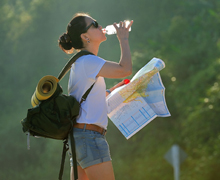
The coronavirus pandemic has caused many Americans to re-think their vacation plans and one of the most popular options now includes heading outdoors to one of the country’s national parks. Those vacationers will most likely include hiking among their daily plans but they need to be prepared. A new study from Arizona State University highlights the critical importance of hikers staying hydrated in the heat of the summer.
Current data shows approximately 25 percent of heat-related illness cases are as a result of dehydration rather than just heat exposure alone. ASU researchers wanted to find out what happens in the body in relation to hydration as it responds to heat stress so protocols and best practices can be developed to help keep hikers safe.
One of the problems associated with hiking in the summer is the heat slows hikers which means they will be exposed to the elements longer. Add to that most hikers do not take enough fluids to account for sweat loss and that extra time hiking increases the chances of heat-related illness.
"The current guidelines for hikers in general are very broad and geared more toward safety than quantifying the adequate amount of fluid they need," said ASU College of Health Solutions Assistant Professor Floris Wardenaar. "The guidelines also do not take into account fitness levels or the importance of incremental exposure to the heat, which can be affected by acclimatization to specific environments and weather conditions."
Researchers worked with a group of 12 hikers in their 20s, seven women and five men. Their resting metabolism, weight, heart rate, core temperature and hydration status were measured before and after their hikes. Their fluid intake was also monitored throughout.
The hikers were asked to make two treks - one on a day where the outside temperature was 68 degrees Fahrenheit and another when the temperature was 105. They were told to bring as much fluid as they thought they would need and were asked to hike the prescribed distance as quickly as possible without becoming uncomfortable.
Researchers were able to calculate the sweat loss by measuring the hikers’ reduction in weight. It averaged about one percent per person regardless of the temperature.
"The 1% bodyweight reduction had different reasons," Wardenaar said. "During hot conditions, participants' sweat rates were higher while drinking more, often resulting in consuming all of the fluid brought, whereas during moderate conditions, sweat rates were lower, but participants drank less. A 1% bodyweight loss is considered manageable and not likely to result in detrimental performance decline. My concern is that when people hike longer than 80 to 90 minutes in hot conditions that they will not bring enough fluid, resulting in larger bodyweight losses."
The hikers took about 20 minutes longer to complete their course during hot conditions which was a cause for concern for the researchers.
"Heat slows you down," Wardenaar explained. "This means that what you normally can hike in 75 minutes under moderate conditions may take up to 95 minutes in the heat. That is something that people should take into account, especially when their hike will substantially exceed the 90 minute cut-off."
Wardenaar encourages hikers to make sure they are well hydrated even before heading out on the trail and to avoid alcohol because it can contribute to dehydration.
Click here to read more in the International Journal of Environmental Research and Public Health.
